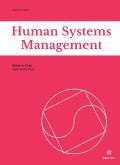Authors: Boutmaghzoute, Hajar | Moustaghfir, Karim
Article Type:
Research Article
Abstract:
BACKGROUND: This study builds on the little guidance in the existing literature to analyze the relationship between employee-oriented CSR actions and employee retention in a business context, while using Freeman’s stakeholders model as a theoretical research framework. This research also aims to shed light on significant behavioral factors facilitating the relationship between CSR endeavors and turnover rate. OBJECTIVE: This paper builds on the existing research gap in the literature and suggests that behavioral factors, including job satisfaction, organizational identification, and motivation facilitate the relationship between employee-oriented CSR actions and employee retention, which contributes to laying the foundations of
…a theoretical framework that has the potential to advance both research and practitioner debates and disentangle the complexity of such a relationship, while offering strategically-focused development venues in the CSR and HRM fields. METHODS: This research uses a single case study design to ensure an in-depth and detailed analysis of the phenomenon under scrutiny, while relying on a triangulation methodology for data collection, including a questionnaire used as exploratory approach, interviews to generate explanatory data, and archival data to bring confirmatory insights. Data analysis followed the procedures of a deductive approach. RESULTS: The research results show a positive relationship between employee-oriented CSR actions and employee retention, while demonstrating the facilitating role of job satisfaction, organizational identification, and motivation in moderating such a relationship. The findings also stress the importance of framing CSR interventions within the organization’s strategy and goals, while ensuring employee participation in such decision making processes to maximize the effect of CSR interventions on employee commitment and reduce turnover. CONCLUSIONS: This research has the potential to better clarify the nature of the relationship involving CSR interventions, from an employee perspective, retention, and turnover, while laying the foundations of a theoretical framework linking such constructs and other behavioral factors that underpin and support such a relationship. Building on the study’s findings and assumptions, future research is needed to gain a more comprehensive understanding of how HR-related CSR actions affect behavioral performance dimensions, resulting in employee commitment and retention. Future research should also consider multiple case study, multicultural, and ethnographic approaches for the sake of generalizability and theory building.
Show more
Keywords: Corporate social responsibility, job satisfaction, organizational identification, employee motivation, employee retention, employee commitment, employee engagement
DOI: 10.3233/HSM-211202
Citation: Human Systems Management,
vol. 40, no. 6, pp. 789-801, 2021





